Diving has become one of our favorite activities. It’s actually not too hard to become a certified diver while on a trip! Getting an Open Water diving certification can take between 2-4 days depending on how rigorous the course is and how much you want to cover. Here’s what we experienced to become PADI Open Water divers.
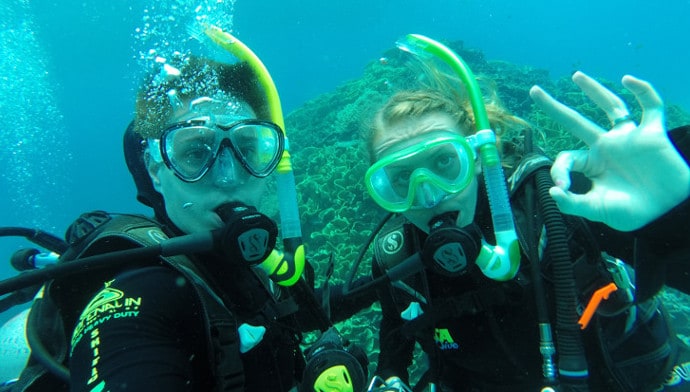
Cairns, Australia
We knew we wanted to do it in a more developed country. While we love places like Thailand, they usually do not have very high safety standards. Or any thought to safety at all. As one Brit put it: “The Buddhists believe in fate, so they don’t plan things out. If it’s meant to go badly, it will. If it’s meant to go well, it will.” That’s terrifying. SCUBA diving does entail some risks, especially for those unfamiliar with it. But good training in the beginning can go a long way towards keeping you safe and making sure your future dives are enjoyable as well.
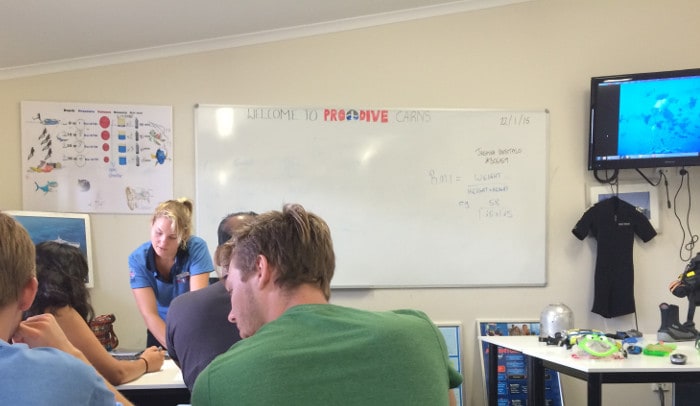
First up, there’s some book knowledge you need
I know, I know. Who wants to be in a classroom on vacation? But learning the theory behind what you’re doing can go a long way to making it more fun as well as much safer. That’s what I really like about the diving community: it’s a safety culture first and foremost. You’ll learn and practice safe diving over and over again. By the time you get certified, you’ll be very comfortable with what to do if something goes wrong.
The dive shops that we’ve been to have been mostly staffed by younger people looking for a fun career in the sun. There’s a lot of 20-somethings that are effectively guarding your life when underwater. When I was in my 20’s, I wasn’t exactly the most responsible person out there nor did I have a ton of attention to detail. And I still had a bit of the “live forever” mentality from my teenage years. This is a really long winded way of saying: PAY ATTENTION TO THE SAFETY PART OF THE CLASSES. While all of our divemasters have been outstanding, at heart they are still young adults who came to this life to party and night and swim during the day. Don’t test their limits. Expand yours.
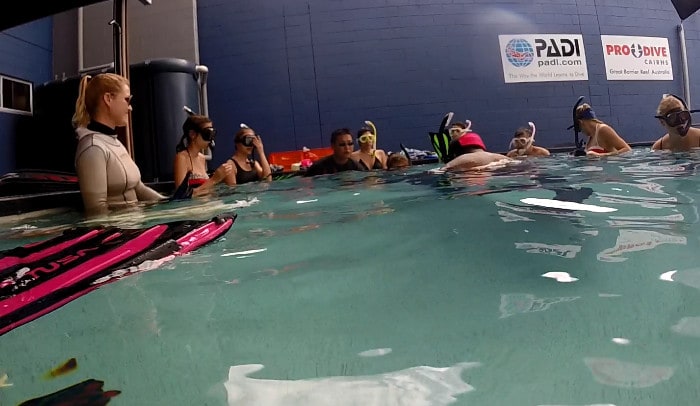
Pool play time!
After learning some theory about how to dive safely, it’s time to get in the water and practice some techniques in the kiddie pool. It’s only mildly embarrassing that you signed up for SCUBA lessons and are using flippers in the shallow end. Don’t worry, soon you get to the good stuff.
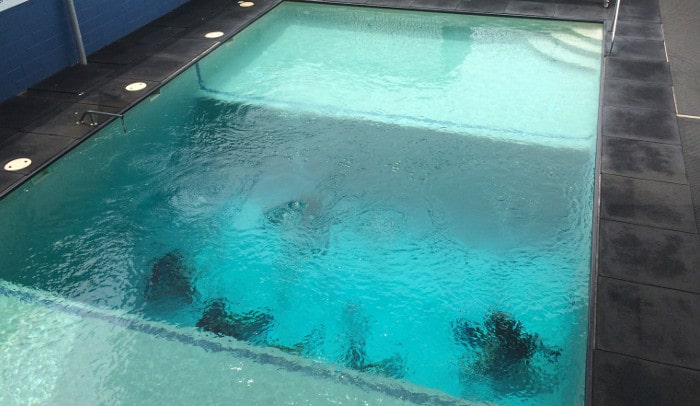
Diving in the pool
Here’s where it starts to get good… and scary. Sorry for no underwater pictures here, but they don’t allow the GoPro along while training. I think this is fantastic as it keeps the focus on the training.
The scary part is necessary to learn how to deal with potentially dangerous situations. They have you remove all of your gear and put it back on underwater. Off goes the mask and your air. You have to put them back on yourself. There’s also the practice of running out of air and having to share your buddies air. I’ve had my mask and regulator (mouth piece) kicked off underwater by another diver, so it certainly is important to learn these skills so you’re comfortable using them when off on your own.
After all of the pool work (sometimes these are done in the shallow parts of the ocean or lake instead of a pool), it’s off to the real fun: completing your certification in the open water!
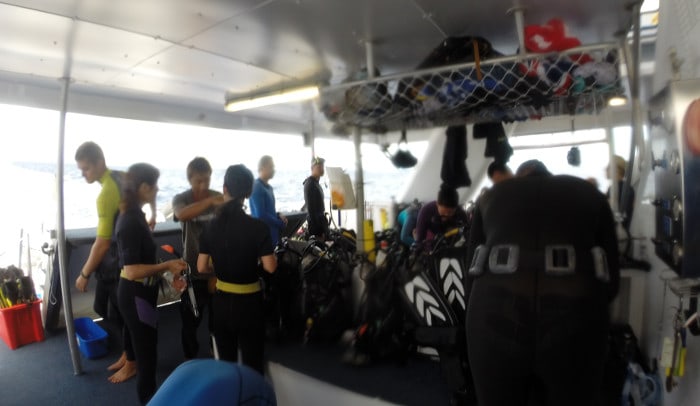 On board the dive boat
On board the dive boat
The other nice thing about doing it in Australia is the wonderful accommodations. This dive boat costs millions of dollars and drives itself by GPS. Learning on a Thai longboat wouldn’t have been terrible, but in Australia there were so many staff members willing to help as well as space on board. When learning something like diving that can be stressful, disorienting, and tiring, it’s good to have the little things taken care of.
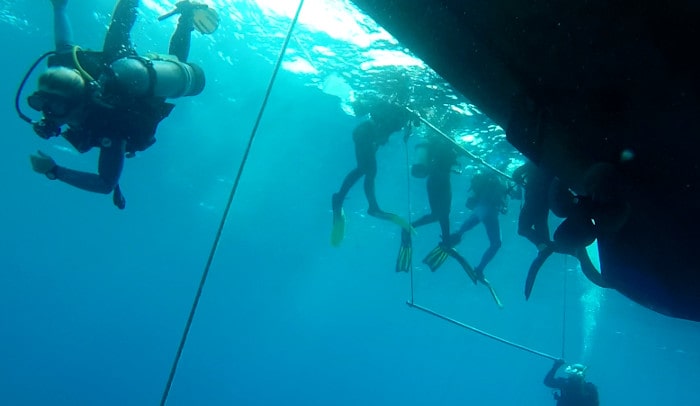
Getting your Open Water certification
Everything that you practiced in the pool, you do in the open water. In the above picture, a class is gathering on an underwater frame before practicing their descent down the descend line. Did I mention how amazing this boat was?
If you can do it in the pool, you can do it in the open water. The Great Barrier Reef was a wonderful choice as there was no current to deal with. When we were in Thailand getting certified on our Advanced Open Water, the current made some of the exercises much more difficult.
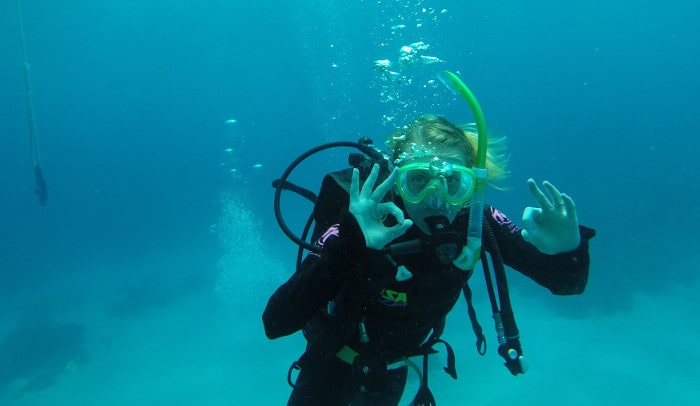
Yay! We’re certified!
Diving is a wonderful experience and we highly recommend it if you’re even slightly intrigued. While the certification can cost a fair amount, subsequent dives can be very cheap. In Thailand, each dive only cost $20!
We’ve gone on to get our Advanced Open water certification to dive deeper, we’ve done night dives, and even dove a wreck! Diving is a wonderful life-long skill and I’m so glad we did it.
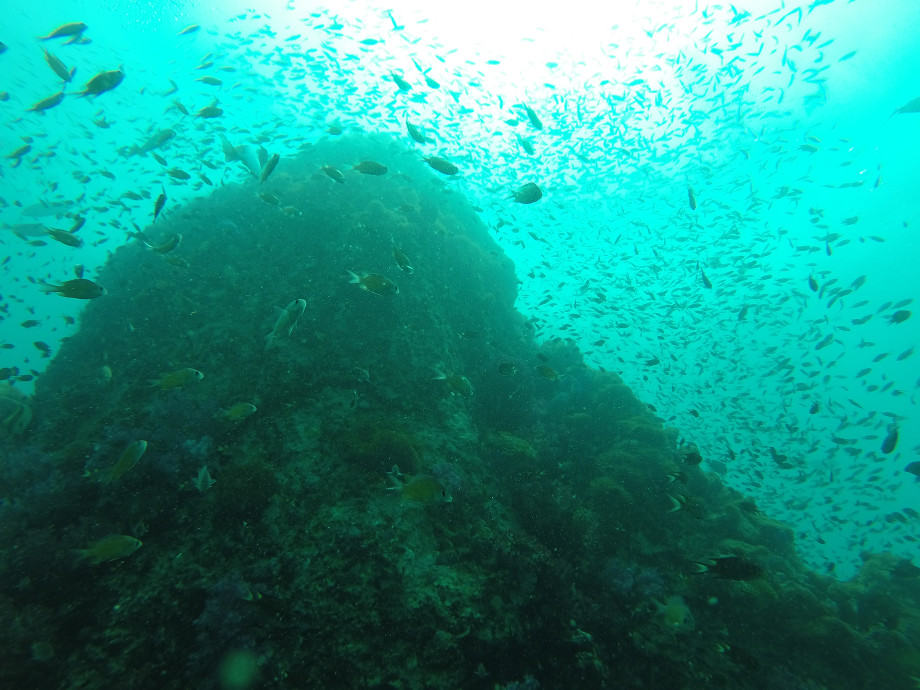
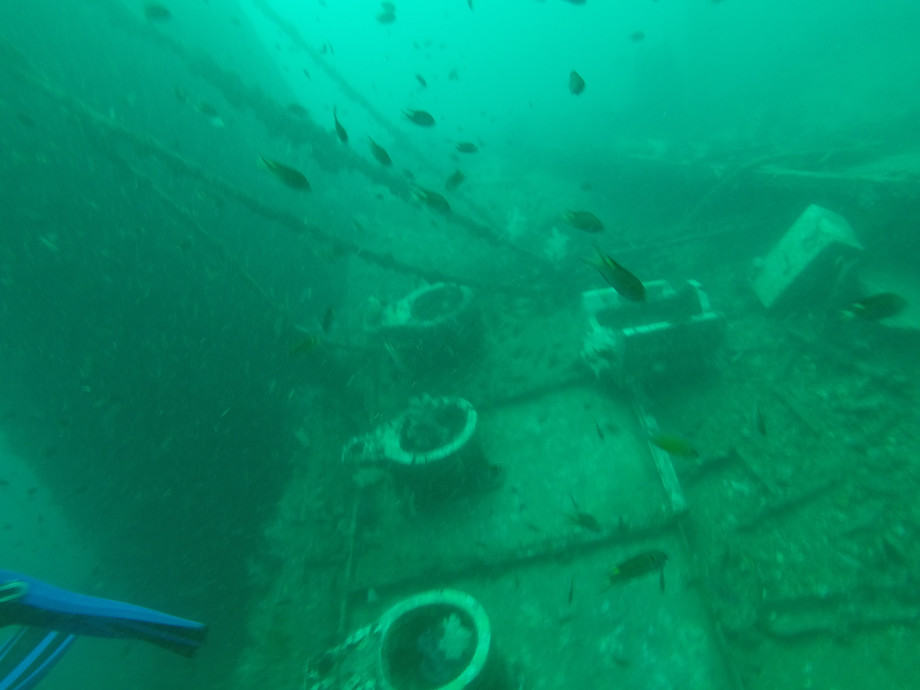
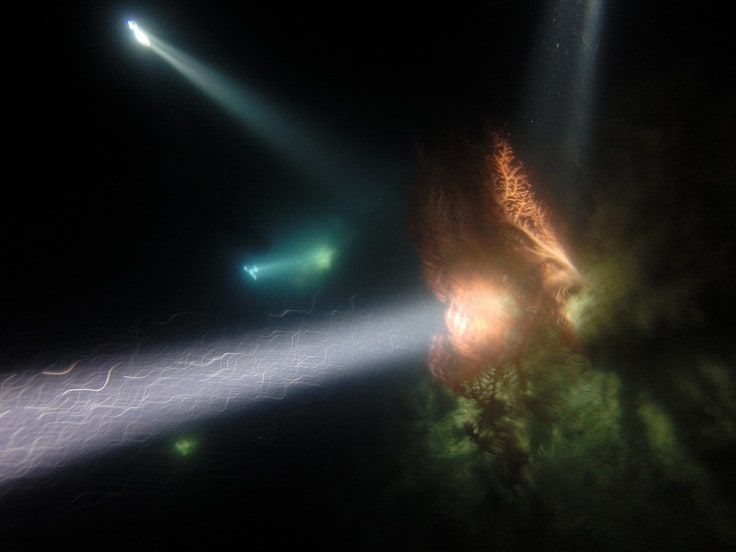

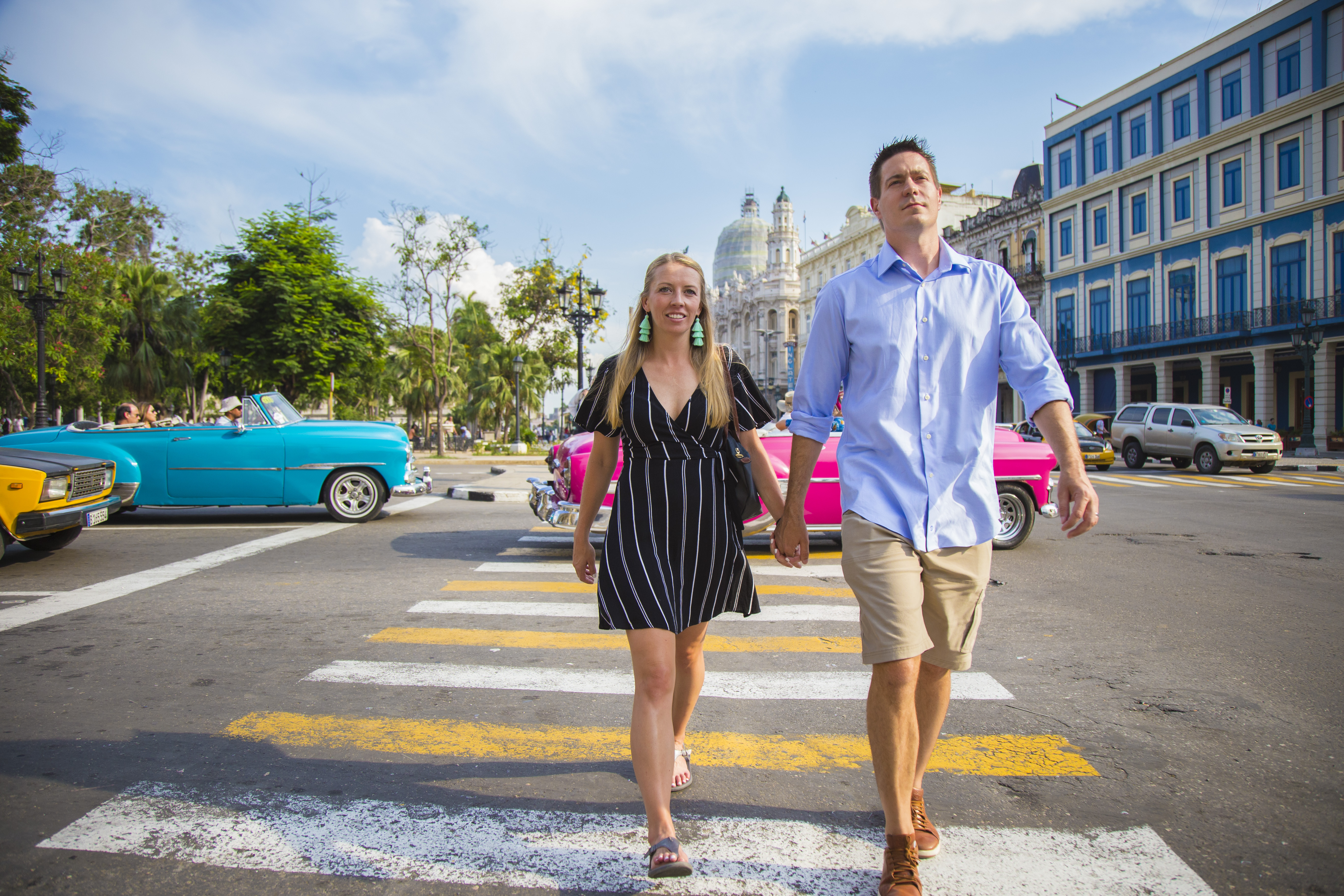
I arrived on this site after being linked to the blog via reddit. I’m a dive instructor and can tell you this article is full of ignorance. You are misleading people by writing as if you know what you are talking about.
“While we love places like Thailand, they usually do not have very high safety standards. Or any thought to safety at all. ”
Completely wrong. The vast vast majority of dive schools on the east and west sides of Thailand are owned and run by Westerners. They have some of the strictest health and safety terms in the world when it comes to diving. If I was to recommend the safest and best diving in the world, I’d direct them to certain schools in Thailand over Australia any day.
“There’s a lot of 20-somethings that are effectively guarding your life when underwater. When I was in my 20’s, I wasn’t exactly the most responsible person out there nor did I have a ton of attention to detail. ”
Every single dive instructor I know, which is 100s, are complete professionals underwater. Just because you were like that in your 20’s doesn’t mean you need to paint these people with the same brush. I know a 20 year old Instructor with 1000s of dives, I know mid 30s Instructors with 100. Who would you pick?
“flippers”
it’s petty but it’s fins. Flipper was a dolphin.
“Learning on a Thai longboat wouldn’t have been terrible, but in Australia there were so many staff members willing to help as well as space on board. When learning something like diving that can be stressful, disorienting, and tiring, it’s good to have the little things taken care of.”
Where on earth in Thailand have you been diving? Apart from in very specific cases, you would never dive off a longboat, especially when learning to dive. Most dive boats in Thailand from reputable schools, whilst they don’t drive themselves, look very similar to the picture you posted.
“In the above picture, a class is gathering on an underwater frame before practicing their descent down the descend line. Did I mention how amazing this boat was?”
That’s pretty standard equipment on any dive boat when people are learning.
I’ve been a dive instructor for 2 years and have around 1600 dives. I’ve taught around Australia, Indo and Thailand. If I was going to recommend where to learn to dive, it would be in Thailand every single time. Safety is the utmost importance, most instructors care deeply about the underwater environment, the instructors are extremely good, and it’s cheap. Indo is a nightmare for safety, and in Australia the Instructors would commonly mess with wildlife.
I have no idea how old this is, or how many people read it, but I hope to god none of them take this as fact.
Author
Hey there. I wrote it, I’ll respond. We dove in Thailand at a PADI certified, Western run dive shop.
In Thailand we took a longboat with a car engine attached to the dive site. Quite different from the 5 million dollar specialized dive boat we had in AUS. The safety equipment on the specialized dive boat far outpaced anything on the longboat. Also, after the dives the crew in AUS practiced a pretend diver rescue.
In Thailand we did a safety stop at 5m, but not for decompression. It was because there was so many boats operating overhead that we had to float a beacon before surfacing. Even after deploying a signal, boats continued to operate above the divers. This didn’t happen in AUS, where the boats were not in motion while divers were in the water.
In Thailand we had to leave a dive site because it was far too crowded, both in number of people for the site and number of people per instructor. In AUS, it was a max of 6(?) in a group. In Thailand we encountered a huge group of 10+ that descended on us from above. Both myself and my instructor had our masks kicked off by the swarm of people. Nothing even remotely like this happened in AUS.
In AUS, we did 9 dives. The lowest seniority member had been at the company as a dive master for 5 years. In Thailand, the longest tenured instructor had been there for 2 years. Our instructor had 6 months of being a dive master under his belt.
Do I have nearly as much dive experience as you? No. But I do know that it wasn’t even remotely close as to which was safer or better run.